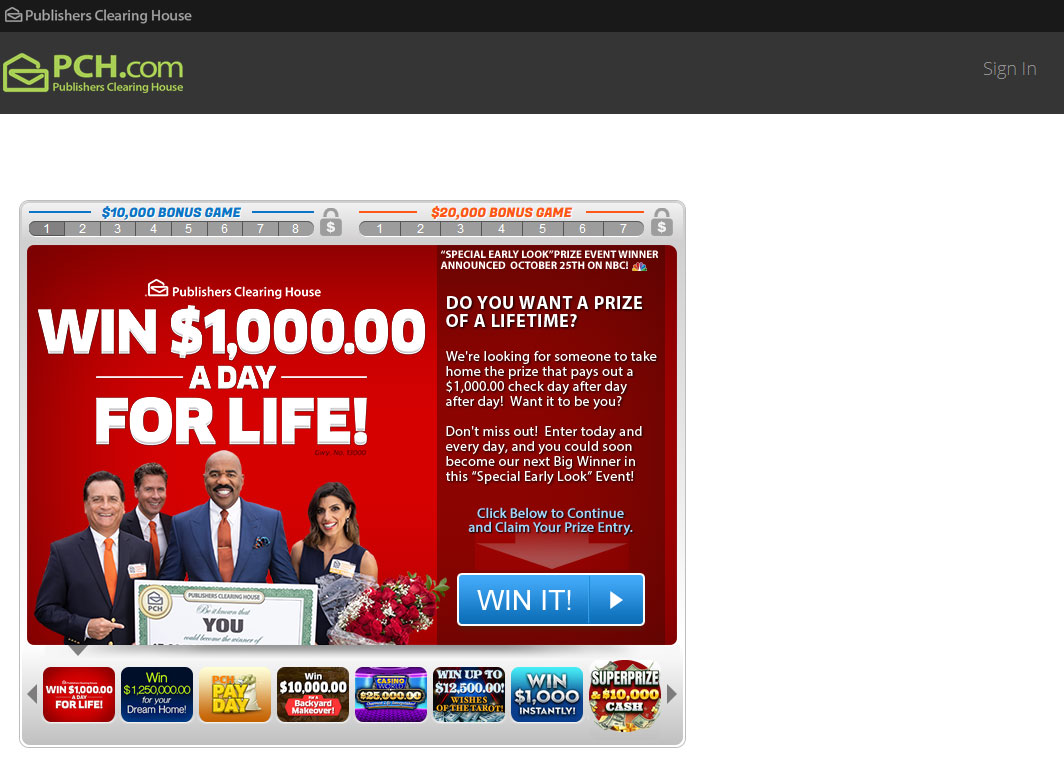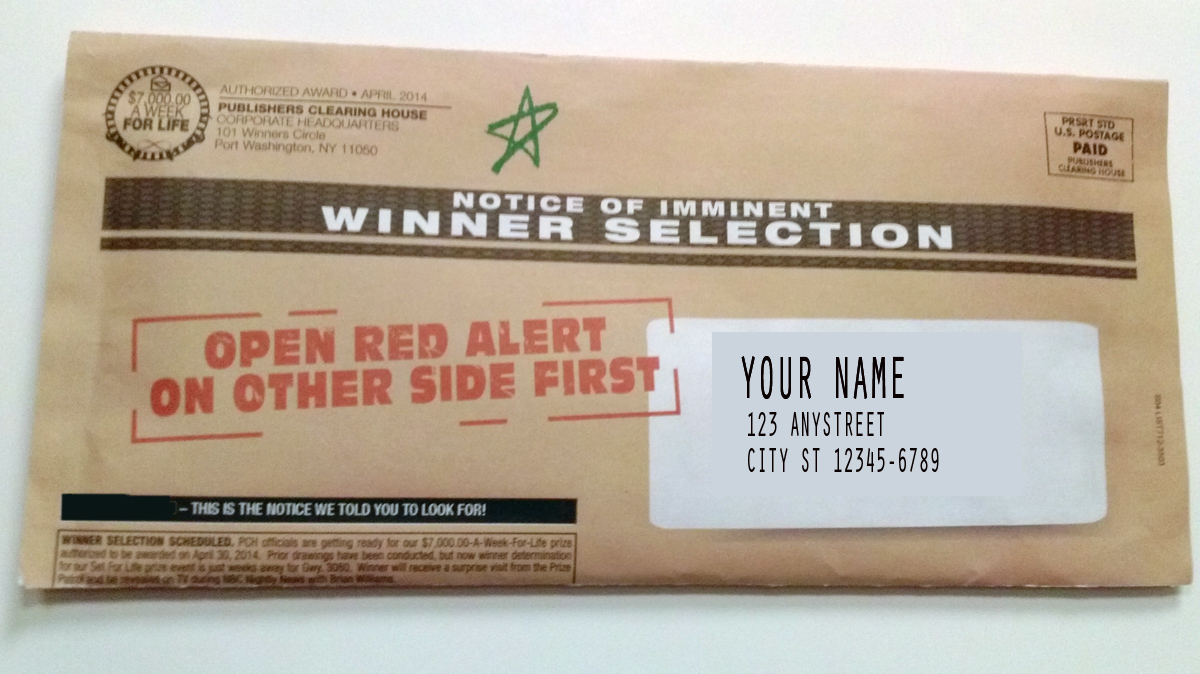Table Of Content

While this may be an opportunity to arrest this person, it would also mean putting yourself at risk being with this person. Contact your local law enforcement before considering such an action. You should always err on the side of safety and assume that anyone who would perpetrate such a scam would also have no conscience about using violence against you. While this may be the first time you have ever encountered it, they have likely run this scam multiple times. Now that you know that PCH sweepstakes are legit, you should also know that you still be scammed if you're not cautious enough. Although PCH's sweepstakes are legitimate, you should be cautious if you receive a prize notification claiming to come from PCH.
Still Not Sure? Get More Tips Directly From PCH.com
If you win a major prize in our sweepstakes, the PCH Prize Patrol will contact you in person. For smaller prizes (usually less than $10,000.00), winners are notified by overnight delivery services (FedEx, UPS), certified mail, or email in the case on online giveaways. Postal Service, thousands of people receive scam mail daily, but "gift tax" and external payments required to accept a prize are often a clear sign that the letters are fraudulent. Christopher Irving, vice president of consumer and legal affairs at Publishers Clearing House, said the company never sends checks to consumers to tell them they have won a prize. When a person wins a major cash prize from Publishers Clearing House, representatives from the company show up unannounced with their "Prize Patrol" carrying a large check, flowers and champagne, he said. "On behalf of members and staff of Publishers Clearing House, Association of North America lottery and provincial sweepstakes, we sincerely congratulate you on the grand prize winnings of ($750,000)," the letter read.
Text Message Scams
Your thoughts, ideas, and concerns are welcome, and we encourage comments. We review all comments before they are posted, and we won’t post comments that don’t comply with our commenting policy. We expect commenters to treat each other and the blog writers with respect. Or that doing so would improve their chances of winning a prize. On top of the fact that all prizes are awarded in person, Publishers Clearing House does not ask that any taxes or other kinds of fees be paid up front for wiring the money or for any other reason. They also will never ask prize winners to help load their winnings onto any kind of a card.
Avoid The Publishers Clearing House Scam
Consumers should always remember that at Publishers Clearing House no payment or fee is ever necessary to enter or claim a prize. Entering sweepstakes and giveaways is fun, exciting and enjoyable. But please keep these valuable tips and warning signs in mind to help you identify which offers are real and which are scams.
His bank could handle that but he would need $58,580 in his checking account to pay state taxes. He was calling his financial advisor so we could help free up enough cash to transfer money to his checking account. To decide whether PCH sweepstakes are right for you, weigh whether a slim chance of winning an enormous prize is worth the trouble of entering and managing unwanted marketing messages. There are some good reasons to add PCH's giveaways to your daily sweepstakes routine. PCH offers truly life-changing prizes that are fun to dream about winning.
Tip 1: Do Not Send Money to Claim a Sweepstakes Prize
Big-name sweepstakes sponsors like PCH are a prime target for scammers, who style win notifications to match the branding of the company they're impersonating. If you receive an email, phone call, email or letter from Publishers Clearing House saying that you're a big winner, it's easy to get so excited that you do or agree to things that make you vulnerable to money and identity theft. That's why it's important to be able to tell the difference between a legitimate prize win and a sweepstakes scam.

And although the odds are extremely long, at least you don't have to pay to enter, like you must with lotteries. If you've received a sweepstakes spam phone call claiming to be from Publishers Clearing House, the Federal Trade Commission advises that you hang up immediately and report the scam to them. You can also report to PCH — they track scams that use their name.

Alabama man wins $1 million from Publisher’s Clearing House, but isn’t home to collect - AL.com
Alabama man wins $1 million from Publisher’s Clearing House, but isn’t home to collect.
Posted: Thu, 31 Aug 2023 07:00:00 GMT [source]
Today, Publishers Clearing House is best known as a “sweepstakes company,” offering our friends and fans a variety of free-to-play, chance-to-win games, contests, sweepstakes and more, all of which span dozens of apps and digital properties. Another way that you can ensure if the notification actually came from Publishers Clearing House is to verify your win with the company directly. Publishers Clearing House has a scam hotline that verifies your win for you.
KARE would like to send you push notifications about the latest news and weather.
The Publisher's Clearing House name is often used by scammers, so the company is very clear and careful about how they notify their winners. Some people worry that because they know lots of people who have entered but no one who's ever won, the prizes aren't awarded and PCH sweepstakes are frauds. Others can't imagine how a company could legitimately give away such big prizes on a regular basis and still stay in business. In May 2022, Google and Twitter users were searching for answers after receiving phone calls from scammers who claimed to be affiliated with the Publishers Clearing House (PCH) sweepstakes.
If you’re a legitimate winner, you won’t be subject to fees or charges before you can claim your prize. If you’re asked to pay anything to claim your winnings, you’re dealing with a PCH scam. Scammers use the promise of winnings to trick you into giving up money or sensitive information. The truth is that people do win Publishers Clearing House prizes.
However, there are some telltale signs that should be enough to ring a warning bell. If you receive any communication claiming to be from Publishers Clearing House, do your due diligence. Contact the company directly and make sure you’re not getting scammed. Fraudsters will sometimes ask victims to open new accounts in order to claim prizes. But in order to do so, you’ll need to “verify” your identity by sharing a bank account number or other sensitive personal information. This allows scammers to take control of the account and steal your identity.
Mail scams often pressure recipients to get on the phone to claim their prize. When recipients contact the company, the scammer will inform them they are required to pay a “processing” or “insurance” fee, according to the Postal Service. During these calls, individuals are usually pushed to share their credit card number.
To those of us who are skeptical and mistrusting at heart, it is easy to recognize this as a scam. This is the lottery scam, one of many elder scams aimed to separate a retiree from their money. The client had received a phone call indicating that Publishers Clearing House selected him as a backup winner when the first winner did not satisfy everything. It involved proof of ID and going to his bank in order to make a tax payment. Because of "some specific tax laws," the client was told that $850K in federal taxes were immediately due to the IRS.
If you comply, the scammer will invent more obstacles that you need to clear before you can claim your prize — such as sending money, information, or both. This scam starts with a phone call informing you that you’ve won a cash prize, a new car, or a vacation. In order to claim the prize, you need to send money to the organization to pay for processing fees or other charges.

No comments:
Post a Comment